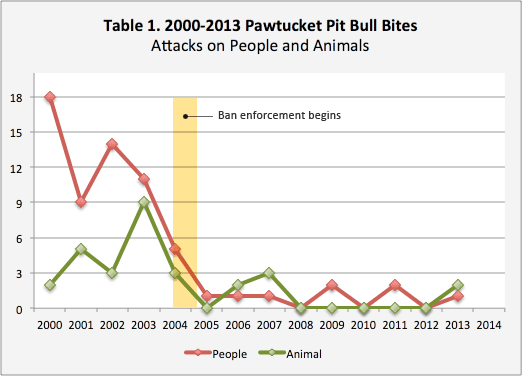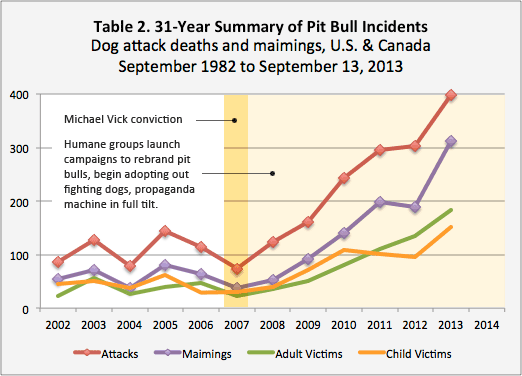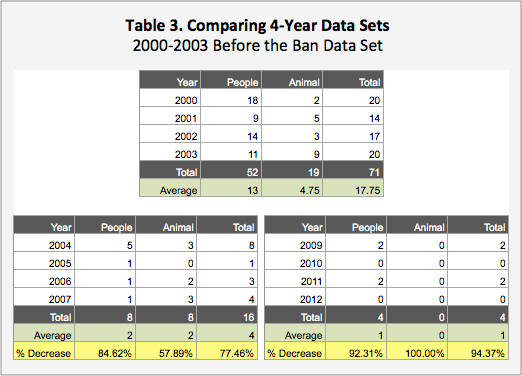Bites Drop Dramatically
Pawtucket, RI - The Valley Breeze recently published over 13-years of pit bull bite data showing the long-term success of Pawtucket's 2004 pit bull ban. The Breeze gained the data through an open records request to the Pawtucket Police Department and Pawtucket Animal Control. After enforcement of the ban began in 2004, attacks inflicted by pit bulls on people and pets in the city quickly plunged into scarcity. Citizens and their pets enjoy this same scarcity of attacks today.
In the 4-years leading up to the ban, there were 52 instances of attacks on people. In the 10-years after the ban, there were only 13.1
John Holmes, Pawtucket's veteran animal control officer and proponent of the ban, said the numbers before and after the pit bull ban "speak for themselves." Holmes added that the last serious attack in Pawtucket was the day the bill was approved by the General Assembly, which was June 9, 2004 according to the legislative body's website.2 Residents have been safer because of the ban, he said. "Public safety has always been the issue," Holmes said.
Charting and Analyzing the Results
To look more closely at the data, DogsBite.org charted it visually and separated out 4-year blocks for comparison. Table 1 shows the immediate impact of the ban after it came into enforcement and how this impact continues today. All over the country -- in jurisdictions that do not regulate this breed -- severe pit bull attacks are rising, specifically since 2007, the year of Michael Vick, when national animal groups began extensive campaigns to "rebrand" and adopt out the breed.

To show readers this difference, we visually charted statistics from the 31-year summary compiled by Merritt Clifton, editor of Animal People. Table 2 shows the number of disfiguring and maiming attacks inflicted by pit bulls from 2002 to 2013 across the U.S. and Canada. Municipalities that regulate pit bulls are immune to the skyrocketing post-Vick trend. Again, driven largely by national humane groups ramping up their pit bull advocacy and the almighty pit bull propaganda machine.
Statistics compiled by Clifton involve worst-case dog attack scenarios: serious bodily injuries and maimings ("mauling injuries") and fatalities inflicted by dogs broken down by breed. We only charted mauling injuries in this comparison, as well as the two victim types: adults and children. In addition to pit bulls and their mixes accounting for 60% of the mauling injuries in Clifton's full report,3 the breed attacks adults almost as often as children, a rare pattern amongst dog breeds.

Table 3 breaks out Pawtucket pit bull bite data into three sets. The first is the four years leading up the ban, 2000 to 2003. The second is the four years after the ban, 2004 to 2007. The last is the most recent four years of data, 2009 to 2012.4 In the four years after the ban, there is an 85% reduction in the average number of people attacked by pit bulls per year, 13 to 2 accordingly. The most recent period, 2009 to 2012, shows an even greater reduction 92%, 13 to 1 accordingly.
Attacks upon animals were sharply reduced after the ban's enforcement began as well. Of the combined attacks upon people and animals, the four years prior to the ban shows that the average number of attacks per year was 18. In the data set following the ban, 2004 to 2007, the average number of attacks per year decreased by 77%, 18 to 4 accordingly. The most recent data set, 2009 to 2012, shows an even greater decrease in attacks per year, 94%, 18 to 1 accordingly.

Download the related PDF file that contains all three tables and source data materials.
Backdrop of the Pawtucket Pit Bull Ban
On July 10, just days before Rhode Island Governor Lincoln Chafee signed a statewide bill prohibiting municipalities from adopting breed-specific laws, Pawtucket Mayor Donald Grebien and City Council President David Moran sent a joint letter to Chafee asking that he veto the legislation. The letter in part cited the effectiveness of Pawtucket's pit bull ban, pointing out the reduced intake and euthanasia of pit bulls and the absence of vicious dog hearings since its passage in 2004.
We've included part of the letter (See: Letter in full):
During the early 2000's, Pawtucket Animal Control Officers responded to many calls about pit bulls seriously injuring people and injuring or killing other animals. Two of the worst cases involved a nine-month pregnant woman who received deep cuts to her arms, legs, shoulder and a broken arm and a child who received severe facial injuries from a pit bull bite to the face. While many of these attacks were caused by pit bulls escaping from their owners' control, other attacks were the result of drug dealers using pit bulls to attack police officers during drug raids.
While proponents of the bill will argue that single-breed ordinances do not work, the results in Pawtucket dramatically prove that they do work. The ordinance banning pit bulls in Pawtucket has worked exceedingly well. In 2003, the year before our ordinance took effect, 135 pit bulls were taken in at the Pawtucket Animal Control Shelter for a variety of health and safety reasons, all from Pawtucket, none from mutual aid, with 48 pit bulls needing to be euthanized. In 2012, 72 pit bulls were taken in, only 41 from Pawtucket, with only six needing to be euthanized. That's a tremendous improvement.
In a June 28, 2013, story in The Times of Pawtucket, a reporter wrote that Dr. E. J. Finocchio, director of the RI Society for the Prevention of Cruelty to Animals, stated that before Pawtucket banned pit bulls in 2004 RISPCA regularly convened vicious dog hearings for pit bulls corralled in Pawtucket. The reporter quoted Dr. Finocchio as saying, "Since the city passed that law we have not had a vicious dog hearing come out of Pawtucket." We believe that our ordinance is certainly working.
July 10, 2013
Mayor Donald Grebien
City Council President David Moran
On July 17, Governor Chafee signed the anti-BSL bill into law anyway (note his 28% approval rating in April), no doubt persuaded by heavy lobbying from national humane groups, the AKC, AVMA and a host of rabid local and national pit bull advocacy groups. It was a grave error by Chafee that promises Rhode Island cities a "forever home" inside the post-Vick skyrocketing trend of disfigurements, maulings and maimings by pit bulls and unwanted pit bulls overloading shelters.
Less than two months later, first-term Governor Chafee, announced that he would not seek re-election. The promised "animal vote" did not save him. As pollster Joseph Fleming pointed out in the September Providence Journal article, "All the poll numbers over the last three years showed him with very low job-approval ratings. … I didn't see any scenario that had him winning as an independent or Democratic candidate. The numbers just weren’t there for the governor."
Sadly, when The Breeze published parts of the letter by Mayor Grebien and Councilor Moran one day before Chafee signed the anti-BSL law, the article noted that Grebien had been a strong Chafee supporter who "had Chafee speak at his 2011 inauguration and has remained closely aligned with the governor." In signing the bill, Chafee not only handcuffed municipalities statewide and opened up the floodgates to new pit bull mauling victims, he also turned against a friend.
Politics is politics my dear friend, even when it results in children getting their faces ripped off.
The Impending "Token" Nutter Lawsuit
Statewide anti-BSL laws are not always absolute. Home rule jurisdictions, such as Denver, can supersede state law and pre-existing ordinances, like Miami-Dade County's pit bull ban, can be protected. Grebien and Moran state in their letter a close situation: "Since Pawtucket's ordinances were in place prior to passage of this bill, which appears to be prospective in nature, we do not necessarily believe that the legislation will prevent us from enforcing our ban on pit bulls."
After the governor signed the anti-BSL law, Pawtucket has continued to enforce their ban. It's hardly a surprise that a token Nutter popped up in Pawtucket with willing financiers not long after its passage. Resident Al Alix, the owner of a pit bull named "Chubs," is threatening to sue the city after receiving multiple off-leash violations and owning a prohibited breed. If the city continues proceedings against him after the September 20 leash violation hearing,5 Alix promises a "battle."
Alix is promising a battle against the city he's called home since he was a child, saying he'll work to put an end to Pawtucket's 2004 ban on pit bulls. Financing his effort will be the Defenders of Animals, a Providence-based group with a mission "to defend the inalienable rights of both companion animals and wildlife..."
---snip---
Providence-based Law Office of Mark Morse serves as legal counsel to the Defenders of Animals and is representing the organization and Alix as they fight Pawtucket's pit bull ban and to uphold a new state law prohibiting such breed-specific ordinances. Ethan Shorey, The Valley Breeze, August 17, 20136
In response to The Breeze publishing Pawtucket pit bull bite statistics, Alix echoed his lawsuit threat and standard pro-pit bull propaganda. He also said that "Pawtucket 'doesn't stand a chance' if this conflict comes down to a court battle." Please review the language of the bill signed by Governor Chafee. The case against Pawtucket's pit bull ban is not a slam-dunk as Alix suggests. Pawtucket is also a home rule city whose local ordinances might supersede state law.
Conclusion: Pit Bull Laws Save Lives
The success of the City of Patwucket's 2004 pit bull ban is indisputable. Not only has the ban dramatically reduced the number of attacks by pit bulls on people and pets, but as Holmes has consistently emphasized over time, and was included in the June 10 letter to the governor by Grebien and Moran, pit bull euthanasia and shelter intake rates have been greatly reduced as well. Meanwhile, jurisdictions lacking pit bull ordinances suffer the post-Vick mauling horror story.
2The Breeze also lumped all of 2004 data into one year, despite the General Assembly not approving the ban until June 9, 2004, half way through the year. We tried contacting multiple entities to determine when "enforcement" of the ban actually began, was it January 1 or June 9, 2004? We were unable to gain this information prior to the release of this post. If enforcement of the ban did not begin until June 9, combined with Holme's statement that the last serious attack occurred "the day the bill was signed into law" (by the General Assembly), it is very likely the comparison of the pre-ban and post-ban periods would be even more dramatic than what is charted.
3The full report, Dog Attack Deaths and Maimings, U.S. & Canada, is updated on DogsBite.org every December. For the purposes of this blog post, we requested pit bull summary data for the years 2012 and 2013 from Clifton.
42013 is not a full year at this time, thus it was not used as part of the 4-year data sets.
5The hearing was originally scheduled for September 13, but was postponed to the 20th.
6Defenders of Animals is the very Providence-based group that initiated the anti-BSL bill, which gained the backing of North Providence legislators, an area with a rising number of pit bull incidents.
Related articles:
08/31/15: Who Can Identify a Pit Bull? A Dog Owner of 'Ordinary Intelligence'...
07/16/13: Cities with Successful Pit Bull Laws; Data Shows Breed-Specific Laws Work
06/01/13: Pit Bulls Lead 'Bite' Counts Across U.S. Cities and Counties
08/16/12: Vote in Miami-Dade County to Repeal Pit Bull Ban Fails by Wide Margin

This is proof in the pudding that BSL works for both humans and animals… if BSL is overturned and there is another serious or fatal pit bull mauling, the blood will be directly on the high court's hands
After enforcement of the ban began in 2004, attacks inflicted by pit bulls on people and pets in the city quickly plunged into scarcity. Citizens and their pets enjoy this same scarcity of attacks today.
"Just like any dog," "it's all how you raise them," "all dogs bite," – All of this "rebranding" has led to sky rocketing pain, suffering and death by pit bulls. Horrifying. I hope Pawtucket doesn't back down.
Not only did they reduce attacks, they avoided the geometric increases of pit bull maulings experienced by other cities!